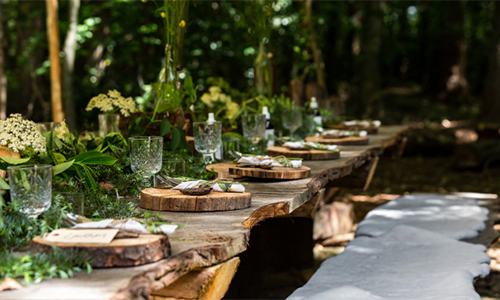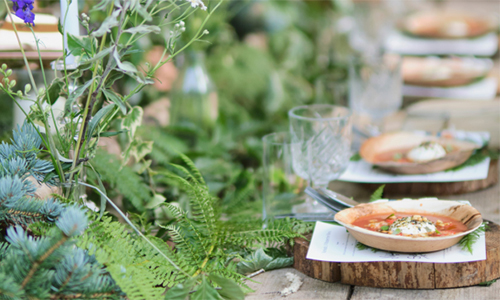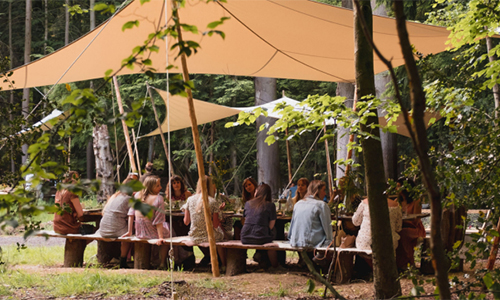From classroom to countryside: my Nomadic teachings
Self-taught forager Noah Ellis (MBA 2018) reflects on the highs, lows and key learnings from founding a restaurant without walls

In 30 Seconds
As an entrepreneur, it is key to focus on your core strengths and not try to perform roles best done by others
When hiring, the best person for the job is the one with the best cultural fit with your company, rather than the most capable individual
Small businesses need to be clear about what skills to prioritise and to be flexible in terms of how to obtain them
About Nomadic Dinners
Set amongst an 87-acre woodland estate close to London, Nomadic Dinners is a ‘restaurant without walls’. Chefs cook everything over an open fire using locally-sourced food and other ingredients that Nomadic forages from its surroundings throughout the year, such as nettle, wild garlic, three-cornered leeks, sorrel and a huge variety of mushrooms. On a four-hour tour of the woodland guests gather ingredients to learn about the edible landscape, followed by a feast in a hidden clearing. Here they dine around an open-fire kitchen in which dishes are prepared for them. After the meal they gather around the fire to toast marshmallows, sip herbal teas and listen to live acoustic music.
Beyond product-market fit
Despite holding an MBA, I struggled with unit economics in the early years of my business. My focus on operations and brand-building distracted me from the financial metrics – I naively believed that a superior product would naturally yield healthy profits. However, reality demanded a complete overhaul of my operating model. I learned the importance of adjusting pricing strategies, optimising cover numbers, eliminating non-value-adding costs and diversifying our customer base, ultimately leading to a greater emphasis on lucrative private bookings.
Nomadic’s unique offering presents inherent challenges in scalability; largely due to the reliance on a few skilled professionals with specialist expertise. For instance, the limited number of foraging specialists in the UK, often characterised by their free-spirited nature, complicates management and availability, while our open-kitchen concept necessitates not only culinary skill but also charisma as chefs must engage with guests while maintaining composure under pressure.
Our guest experience comprises a foraged cocktail upon arrival, a foraging tour, live entertainment, a four-course feast, and handpicked herbal teas around the fire, catering to 200 attendees each weekend. The complexity of this experience creates numerous touchpoints in the customer journey, and today’s customers are less forgiving than those of our early days in 2018.

When Nomadic first emerged on the scene, the competitive landscape was characterised by a handful of small, yet passionate players, each offering unique experiences that tapped into the growing interest in foraged and wild cuisine. The market was fragmented, with each player carving out a niche but lacking the scale or brand recognition to dominate the space. This environment allowed us to flourish as we connected with guests seeking innovative and unique culinary experiences in nature.
Fast forward to today and the competitive landscape has evolved dramatically. New entrants have emerged and the competition is tougher, with larger players wielding significant resources and influence. However, Nomadic’s commitment to authenticity, intimate guest experiences and our unique approach to foraging continues to differentiate us in a vibrant and evolving market.
Another factor that has helped us greatly is the London Business School alumni network. It would be remiss of me not to mention Brandon Stephens (MBA2005) here, a fellow London Business School alumni and founder of Tortilla restaurant chain, whose advice when I was starting out proved invaluable. Brandon, whom I had never met before reaching out on LinkedIn, was incredibly generous with his time and knowledge. Another London Business School alumni, Jack Huang (MBA2009), founder of leading experience platform Truly Experiences, agreed to list Nomadic very early on, before anyone had heard of us, and gave me insightful advice concerning what he believed a great experience should include and how to optimise pricing strategy.
Lessons learned
As a business owner, most of my time is concerned with relationships and people. In this regard I have two observations. First, the ‘best’ person is rarely the most capable individual, but rather the one with the best cultural fit with the organisation. I always prioritise attitude over aptitude when it comes to staffing.
Second, as a small business, you need to be clear about what skills to prioritise and to be flexible in terms of how to obtain them – even a business demonstrating strong growth with a high six/low seven-figure turnover will not be able to afford an FD/MD/OD as their salary will most likely comprise more than 10% of company income.

At Nomadic, for example, no staff are involved in marketing; however I work with a friend (ex-Google) who helps me one day per month with paid social media ads. We outsource accounts to a third party and focus on three to four critical metrics, rather than getting bogged down in minutiae. As we are a seasonal business we have no full-time staff but work with a team of freelancers, so we can scale up and down with events accordingly. Another lesson concerns misjudging customer acquisition costs and timelines. This is a common pitfall for many startups and I was no exception. We worked hard to onboard new clients but it wasn’t really until Covid hit that we saw a huge uptake in the demand for outdoor dining experiences. Unfortunately, due to the restrictions in place, we were unable to capture a lot of latent demand.
“The ‘best’ person is rarely the most capable individual, but rather the one with the best cultural fit with the organisation”
Initially, my passion for Nomadic offset these obstacles (my wife often likened it to my second child). I dedicated long hours in challenging conditions, earning little while peers enjoyed stable, lucrative jobs. I embraced every aspect of the business, from cleaning dishes and toilets to driving chefs – and even making last-minute grocery runs. The novelty and excitement fuelled my commitment and I thrived in my multifaceted roles.
Witnessing the joy of our guests and the unique experiences we created was immensely rewarding. I commissioned a tree surgeon to construct a table from a fallen tree, leading to unforgettable photo opportunities for our guests. However, as challenges mounted – especially around the time of the pandemic – my enthusiasm waned. The pressure of maintaining the business took its toll and I grappled with feelings of exhaustion and inadequacy.
Despite our growth, I felt Nomadic had lost its essence, prompting me to reassess our direction. In early 2023, I made the difficult decision to remove the management team and start anew.

“Embracing neurodiversity has allowed me to focus on my strengths and delegate effectively”
Throughout my journey, I have recognised my dyslexia as a strength. While it posed challenges in my early years, it has also shaped my perspective and resilience – qualities that are essential for any entrepreneur. I see similar traits in my son, who asks insightful questions that reflect a unique viewpoint. Embracing neurodiversity has allowed me to focus on my strengths and delegate effectively.
I have also learned the importance of focusing on your core strengths. Mine lie in creativity and people management. While I have a fundamental understanding of numbers, my focus should have remained on selling the vision and recruiting the right talent to execute it. It took time to realise that involving myself in operations and finance was not where I could add the most value, and stepping away from these roles enabled me to focus more on growing the business – but, as every entrepreneur knows, you don’t always get to decide!
The personal toll
The entrepreneurial journey has undoubtedly affected my personal relationships. I am fortunate to have a supportive family, but the demands of startup life have tested their patience. The hardest moments include making tough decisions that impact team members’ livelihoods and missing out on life events due to business emergencies.
As I reflect on my experience with Nomadic, I recognise both the successes and challenges that have shaped my path. I have given guided tours to Jude Law and Kate Moss, and welcomed Steve Backshall, Linford Christie, Mike Tindall, and Zara Phillips. I have spent time behind the camera with Gordon Ramsay and in front of it during the semi-finals of Masterchef as a guest judge, where I had the opportunity to taste each contestant’s food at the experience I created. These stories will stay with me for the rest of my life and provide entertainment for my children in years to come.
My proudest moment, however, came last year with the simple act of cashing a cheque that represented the culmination of every investment I made into the business. Has it all been worth it? The answer remains elusive, yet I have no regrets. The lessons learned through this journey have forged resilience and a deeper understanding of what it means to be an entrepreneur.
Discover fresh perspectives and research insights from LBS




